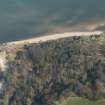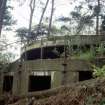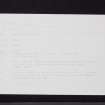Scheduled Maintenance
Please be advised that this website will undergo scheduled maintenance on the following dates: •
Every Thursday from 17th October until 7th November from 11:00 to 15:00 •
Tuesday, 22nd October from 11:00 to 15:00
During these times, some services may be temporarily unavailable. We apologise for any inconvenience this may cause.
Forth Defences, Inner, Hound Point Battery
Coastal Battery (First World War)
Site Name Forth Defences, Inner, Hound Point Battery
Classification Coastal Battery (First World War)
Alternative Name(s) Forth Defences; World War I; Dalmeny Park; The Warrens; Hound Point Battery, 150m W Of Fishery Cottage
Canmore ID 50454
Site Number NT17NE 70
NGR NT 15825 79322
Datum OSGB36 - NGR
Permalink http://canmore.org.uk/site/50454
- Council Edinburgh, City Of
- Parish Dalmeny
- Former Region Lothian
- Former District City Of Edinburgh
- Former County West Lothian
It was important to prevent coast defence batteries being put out action by enemy troops landing and attacking them from behind. As a consequence, many of them had strong landwardd efences, and Hound Point was no exception. Two lines of blockhouses were built in an 'inner' and an 'outer' line, with six blockhouses in both lines (see NT17NE 70.04). The inner line of blockhouses was linked by a barbed wire entanglement (The National Archives WO78/4396).
Information from HS/RCAHMS World War One Audit Project (GJB) 20 August 2013.
Field Visit (17 February 1996)
Armed 1914, disarmed 1916. Concrete structures, two circular and one rectangular. Circular structures consist of small room at ground level, with iron railed circular platform above. The rectangular structure consists of two small rooms with middle entrance. Circular stone 1m diameter 0.25m thick resting on wooden stand. The site is overgrown, the concrete is weathering, and the iron is corroding.
Site recorded by GUARD during the Coastal Assessment Survey for Historic Scotland, 'The Firth of Forth from Dunbar to the Coast of Fife' 17th February 1996.
Field Visit (1997)
This battery is situated on a high ridge to the S of Hound Point near the track which runs through the Dalmeny Estate and N of the 'The Warrens'. The remains consist of two concrete gun emplacements with a magazine building to the rear. In addition, it is possible to see traces of hut bases, and a pile of brick rubble near the gun emplacements which may possibly be that of the observation post.
Work on this battery had commenced before the outbreak of World War One and when armed in 1914 consisted of two BL 6-inch Mk VII guns on CP Mk II mountings. These guns were then transferred to the battery at Leith Docks (NT27NE 162) under a revision of armament during 1915. The 6-inch guns were replaced in the Autumn of 1916 by two 12 pounder Quick Firing (QF) Naval 18cwt guns removed from Inchcolm (NT18SE 22.00). The guns were dismounted and returned to store in 1922.
J A Guy 1997; NMRS MS 810/5, 60-4; PRO WO 78/5173
Project (March 2013 - September 2013)
A project to characterise the quantity and quality of the Scottish resource of known surviving remains of the First World War. Carried out in partnership between Historic Scotland and RCAHMS.
Field Visit (29 August 2022)
The First World War Coastal Battery centred on Hound Point comprised two gun emplacements 22m apart, each incorporating ammunition lockers and crew shelters (NT17NE 70.01), a magazine, an engine house and a Battery Observation Post (BOP) immediately to the SW (NT17NE 70.02), buildings (probably administration, stores and accommodation) about 25m to the W of the gun emplacements (NT17NE 70.03), and pillboxes (NT17NE 70.04) which formed two rings of defence around the battery. Each of the individual elements of the battery is described within its subnumbered record.
Visited by HES Survey and Recording (J. Sherriff, A. McCaig) 29 August 2022.
Note
NT17NE 70.00 15825 79322
NT17NE 70.01 NT 15810 79327 and NT 15839 79313 Gun-emplacements
NT17NE 70.02 NT 15816 79305 Magazine
NT17NE 70.03 c.NT 1578 7932 Huts
Armed November 1914; 2 x 6" guns. Disarmed 1916.
H H Clark 1986












